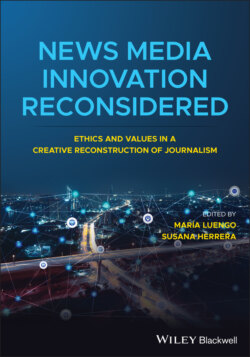Читать книгу News Media Innovation Reconsidered - Группа авторов - Страница 18
Blogs and Bloggers
ОглавлениеAs the self-publishing platforms were easier to use, horizontal communication channels proliferated, and all kinds of blogs rapidly incorporated the voice of citizens into journalism. Bloggers claimed the professional territory of journalists: selecting events and topics for the audience and commenting on relevant issues through content aggregation. This led to further tensions between the possibilities afforded by innovations in news production and the normalizing force of established newsroom routines (Mitchelstein, Boczkowski, and Wagner, 2017). Professionals quickly drew the frontier between journalists who valued equity, accuracy, balance, and other ethical criteria, and content providers with their opinion blogs, which lacked a professional status (Singer, 2003).
One of the ways in which journalists differed from bloggers was their independence, based on neutrality, impartiality, or objectivity. Bloggers, on the other hand, published their personal views and raised ethical problems. “It is not a fair, impartial or objective journalism, nor does it intend to be. As they do not adhere to journalistic norms, bloggers do not have to be objective or politically correct,” protested one newspaper editor (Carlson, 2007, p. 268). The success of bloggers posed the question of which characteristics defined a digital journalist (Hayes, Singer, and Ceppos, 2007).
An ethical problem that journalists frequently criticized was that the material published on blogs was not verified and, therefore, was not reliable. An editor summed up this concern: “If something appears in The Washington Post or The New York Times, I know it has been reviewed by someone whose profession requires them to have it checked. With a blog, you have no idea. Bloggers don’t know how to verify the facts. Calling a blogger a journalist is like calling a photographer anybody who takes a snapshot” (Carlson, 2007, p. 274).
Criticisms related to impartiality and verification pointed to the emergence of a norm that was especially suitable for digital media: transparency. It was important for the disclosure of a blogger’s background, their personal interests and financial ties. Although the norms of objectivity and balance made it difficult for some journalists to adhere to blogging, blogs became an acceptable innovation by 2012 (Mitchelstein, Boczkowski, and Wagner, 2017).
